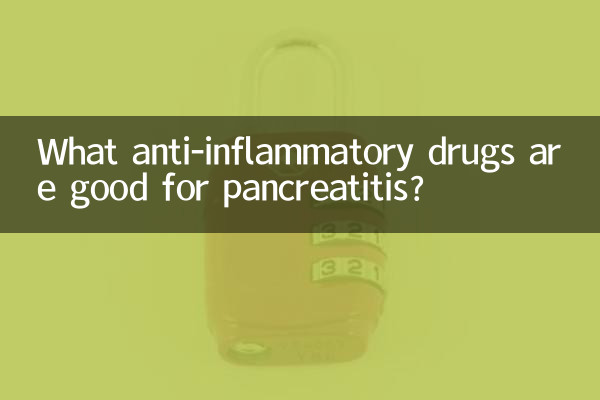What anti-inflammatory drugs are good for pancreatitis?
Pancreatitis is a common digestive system disease, divided into two types: acute and chronic. No matter what type of pancreatitis it is, the use of anti-inflammatory drugs needs to be cautious and must be done under the guidance of a doctor. This article will combine the hot topics and hot content on the Internet in the past 10 days to provide you with a detailed introduction to anti-inflammatory drugs suitable for patients with pancreatitis and related precautions.
1. Common symptoms of pancreatitis

The main symptoms of pancreatitis include severe pain in the upper abdomen, nausea, vomiting, fever, etc. Acute pancreatitis may be accompanied by shock or multiple organ failure, while chronic pancreatitis may lead to indigestion and diabetes. Therefore, timely treatment and rational use of medication are crucial.
2. Commonly used anti-inflammatory drugs for pancreatitis
The inflammatory response of pancreatitis usually requires anti-inflammatory drugs to control, but not all anti-inflammatory drugs are suitable for patients with pancreatitis. Here are several common anti-inflammatory drugs and their use:
| Drug name | Applicable type | Mechanism of action | Things to note |
|---|---|---|---|
| Cephalosporin antibiotics | Acute pancreatitis (infection) | Inhibit bacterial cell wall synthesis | A doctor's prescription is required to avoid abuse. |
| Metronidazole | Pancreatitis combined with anaerobic infection | Destroy bacterial DNA structure | Gastrointestinal side effects may occur |
| Ulinastatin | acute pancreatitis | Inhibit the release of inflammatory factors | Requires intravenous injection, used in hospital |
| NSAIDs (such as ibuprofen) | mild pain relief | Inhibit prostaglandin synthesis | Avoid long-term use as it may damage gastric mucosa |
3. Medication precautions for patients with pancreatitis
1.Take medication as directed by your doctor: The use of anti-inflammatory drugs for pancreatitis must strictly follow the doctor's instructions. Do not buy or change drugs at will.
2.Avoid overuse of antibiotics: Antibiotics are only suitable for patients with pancreatitis combined with bacterial infection, and misuse may lead to drug resistance.
3.Be aware of drug side effects: Some anti-inflammatory drugs may cause gastrointestinal discomfort, allergic reactions, etc. You need to pay close attention to your body's reactions during medication.
4.combined with other treatments: Anti-inflammatory drugs are only part of the treatment for pancreatitis. Patients also need to cooperate with comprehensive treatments such as fasting, fluid rehydration, and nutritional support.
4. Dietary recommendations for pancreatitis
In addition to drug treatment, dietary modification is also very important for recovery from pancreatitis. The following are dietary recommendations for people with pancreatitis:
| food type | Recommended food | avoid food |
|---|---|---|
| protein | Low-fat fish, chicken breast, tofu | Fatty meat, fried food |
| carbohydrate | Rice, noodles, oats | High-sugar pastries and carbonated drinks |
| Vegetables and fruits | Carrots, spinach, apples | Spicy vegetables, acidic fruits |
5. Summary
The choice of anti-inflammatory drugs for pancreatitis needs to be determined based on the severity of the disease and whether there are co-infections. Patients must take the drugs under the guidance of a doctor. At the same time, a reasonable diet and living habits are crucial to the recovery of pancreatitis. If symptoms of pancreatitis occur, seek medical attention promptly to avoid delays in treatment.
Through the introduction of this article, I hope it can help you better understand the medication and dietary precautions for pancreatitis. I wish you a speedy recovery!

check the details

check the details